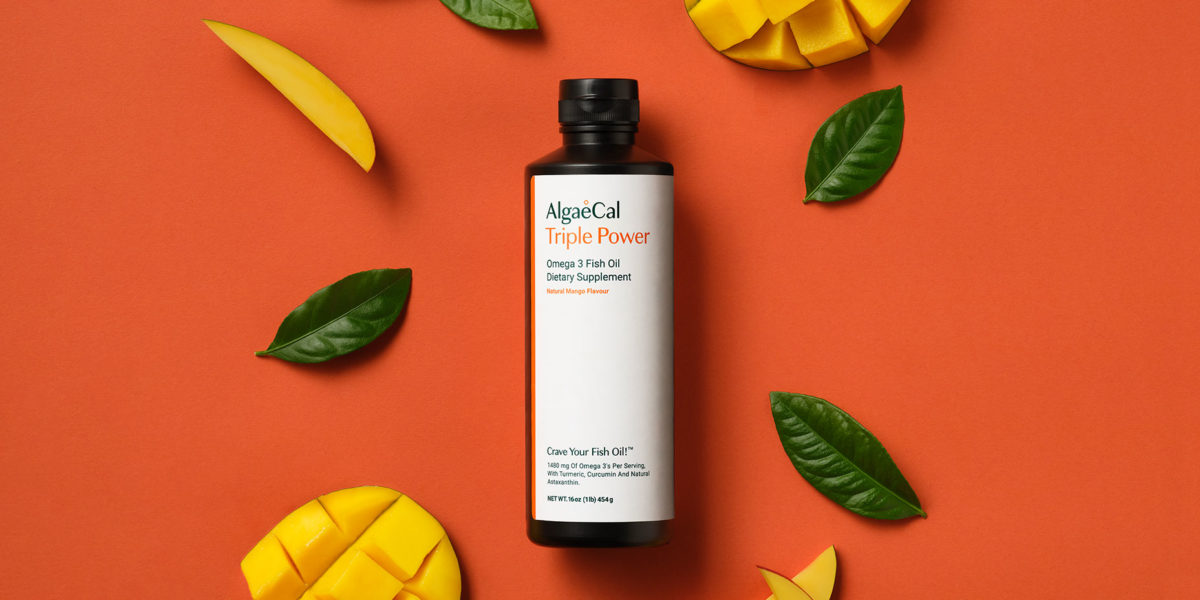Omega-3s are one of the most popular supplements on the shelf, but most people need to be made aware of the vast differences in quality out there. As is true for most things in life, not all omega-3 supplements are created equal.
In this article, we’ll explore:
- Why supplementing with omega-3s is essential to health
- The benefits of omega-3s
- How to choose a high-quality omega-3 supplement
- How to determine what your unique omega-3 needs are
Why You Need To Supplement With Omega-3s
For the most part, supplements should only be taken if your body truly calls for the nutrients it contains. When it comes to omega-3s, it’s fair to say that almost every person on this planet needs an extra dose.
Why?
Historically, research asserts that our ancestors ate a diet with about a 1:1 ratio of omega-3 and omega-6. This balance was crucial for maintaining cellular health, immunity, inflammation levels, and more[1].
A common misconception today is that omega-3 fats are healthy and omega-6 fats are unhealthy. In reality, both of these types of fatty acids are crucial for our body’s overall health, but they must be consumed in balance. Today, our western diet provides an omega-6 to omega-3 ratio closer to 15:1, with omega-6 outweighing omega-3 15-fold[1].

This is primarily due to the industrialization of food, with an enormous amount of omega-6 oils sneaking their way into processed foods via seed oils. 100 years ago seed oils for cooking didn’t exist as our ancestors used beef tallow, butter and lard. Today, convenient vegetable and seed oils have almost entirely replaced traditional low omega-6 fat sources.
Unfortunately, the quality of our seafood, which is the primary source of omega-3 fats, has also gone downhill, pushing that ratio to the abysmal 15:1 that we see today. While wild fish still consume their regular diet, farmed fish (which has become increasingly popular) is often fed lower-quality feed that leaves the fish depleted of their omega-3s. In a report from the BBC back in 2016, it was estimated that farmed fish had lost about 50% of their original omega-3 fatty acid content[2].
While there is no standard for the recommended daily intake of omega-3s, most governmental health agencies agree that we should aim for about 2.6 grams to 3 grams of combined omega-3s each day. To put those numbers into perspective, that’s about 6 ounces of fish daily.
It’s fair to say that the vast majority of people are not meeting those standards[3].
This is why supplementing with omega-3s has become so popular; it’s not a matter of “nice to have”; it’s essential.
Benefits Of Omega-3 Supplements
There are three primary omega-3 fatty acids; DHA, EPA, and ALA. While EPA and DHA are primarily found in animal foods (and algae), ALA comes from plants. ALA also serves as a precursor to both DHA and EPA, although its conversion to these two fatty acids is not very strong, which is why most supplements focus on DHA and EPA instead of ALA.
Omega-3 supplements are most well-known for their anti-inflammatory activity, but these nutrients actually provide a range of health benefits.
Health Benefits of DHA and EPA
- Boosts bone strength by enhancing calcium uptake, potentially diminishing the risk for osteoporosis[4]
- Reduces joint pain[5]
- Improves muscle strength and reduces wasting (sarcopenia)[6]
- Improves mental health (depression and anxiety)[7]
- Assists in healthy eyesight[8]
- Decreases inflammatory chemicals and markers in the body[9]
- Supports neurological health and functioning (both in infancy and older age)[10]
- May improve ADD and ADHD in children[11]
- Improves markers for heart disease such as triglycerides, blood pressure, cholesterol, and blood clotting[12][13][14][15]
- Improves immunity and may lower the risk for autoimmune disease[16]
- Increases sleep quality[17]

How to Choose An Omega-3 Supplement
Now that you’re versed in the benefits of omega-3s and understand why supplementing them in your diet is crucial, how do you choose which one to go with? There are hundreds (if not thousands) of omega-3 supplements, so how do you know which one is best for you?
Before placing an order or dropping a bottle of fish oil in your shopping cart, just think of the “3 Ps”:
- How potent is the product?
- How pure are the omega-3s?
- How palatable is it? (Can you actually get it down?)
Potency
The potency of your omega-3 supplement comes down to two things:
- How many milligrams of EPA and DHA do you get per serving
- What is the serving size?
Many companies flash marketing on the bottle claiming that they provide a potent dose of omega-3s per serving, but when you actually take the time to look at what a serving size is, you see that you’re meant to consume an enormous amount of oil each day. This could be several teaspoons or tablespoons, or handfuls of capsules.
Other companies may offer a more realistic serving size, but the amount of EPA and DHA you get is a fraction of your daily needs.
Ultimately, your omega-3 supplement should offer a generous dose of omega-3s in a reasonable serving size.
The next part of an omega-3 supplement’s Potency is bioavailability. Bioavailability is a word that describes your body’s ability to break down, absorb, and utilize a nutrient. When a supplement has high bioavailability, your body soaks it up and integrates it seamlessly because it recognizes it as something vital for your health and well-being.
On the other hand, supplements with low bioavailability may be harder for your body to recognize and therefore utilize.
The bioavailability of omega-3 supplements primarily comes down to the form of the fatty acids that it contains.
When looking for a highly bioavailable omega-3, you always want to go for natural triglycerides. This is the form of omega-3 that’s found in nature and has undergone the least amount of processing. Your body knows exactly what to do with natural triglycerides, which means you get the most bang for your buck[21].
Some manufacturers will take natural triglycerides and convert them into ethyl esters through a process called “transesterification.” The benefit of transesterification is that it increases the amount of EPA and DHA up to third-fold; the downside is that these new fatty acids are much less bioavailable. This means that a supplement may boast a high dosage on its label, but your body can only absorb a fraction of it.
Furthermore, there is some concern about the safety of ethyl esters for vulnerable populations like pregnant women and children[22].
Finally, there are synthetic triglycerides, which are ethyl esters that have been transformed back into triglycerides. This process once again alters the structure of the fatty acid, making it even more confusing for your body to recognize.
Purity
Omega-3 supplements can come from a variety of sources. For instance, some omega-3s can come from algae, while others come from fish. And within the fish category, some come from larger fish like cod, while others come from smaller fish like sardines.
Knowing the source of your omega-3 supplement will tell you a lot about the quality of the omegas. For example, while algae is rich in DHA, most algae-based supplements don’t have a good balance of EPA.
Furthermore, and perhaps even more important, omega-3 supplements made from larger fish are much more likely to contain toxic compounds called PCBs (polychlorinated biphenyls), which are a type of environmental pollutant that seeps into our water supply and contaminates the fish.

In one study, researchers found that only 8% of omega-3 supplements tested contained safe levels of toxic contaminants – a staggering 92% contamination rate[18].
What makes PCBs so dangerous? These man-made compounds have been linked to health concerns such as endocrine disruption and cancer[19][20].
Smaller fish that are lower on the food chain, such as sardines, anchovies, and mackerel, tend to pick up fewer PCBs because they are bottom feeders, which means that their own food supply is generally pretty pure. Ultimately, smaller fish provide an ideal source of omega-3s with their combined EPA/DHA ratio, along with a reduced risk for contamination.
Another aspect of omega-3 quality that needs to be assessed is oxidation. Omega-3s are inherently vulnerable to oxidative stress due to the structure of these fatty acids, which means that your omega-3 supplement must contain a potent antioxidant to protect the fatty acids from breaking down.
When fatty acids become oxidized, they not only taste and smell bad, but oxidized oil creates inflammation – which is the exact opposite of what you’re looking for with your omega-3 supplement.
While most companies do add some type of antioxidant to their oils, the quality of the antioxidant also matters. For example, one study found unacceptably high levels of oxidation in 80% of the fish oils tested[21].
While vitamin E is a common choice and fits under the “natural antioxidant” label, sources of antioxidants like curcumin and astaxanthin are much more powerful and come with their own health benefits.

Palatability
One of the most common complaints that people have regarding fish oil supplements is their palatability. Many supplements have a fishy taste and often produce a fishy burp after you consume them. While this may seem relatively harmless, the burp actually comes back to the bioavailability of the oil, and the fishy taste is a tell-tale sign of oxidation.
When you have a supplement that’s composed of natural triglycerides, your body will readily accept it and digest it. However, ethyl esters and synthetic triglycerides are much more likely to produce a burp or other digestive discomfort.
As for the fishy taste, supplements made with powerful antioxidants like curcumin and astaxanthin will eliminate the fishy taste by preventing oxidation and rancidity.
What Are The Best Omega-3 Supplements?
It may seem like a lot to consider, but when you pull it all together, the best omega-3 supplements will contain the following:
- Natural triglycerides (as opposed to synthetic or ethyl esters).
- High-quality antioxidants like astaxanthin and curcumin which not only serve to protect the oil but also contain their own health benefits like anti-inflammation.
- Omega-3s are sourced from smaller, short-lived fish like sardines, anchovies, and mackerel.
- High levels of both DHA and EPA per serving, with modest serving sizes that don’t require you to swallow a handful of capsules or a mouthful of oil.
Remember to keep in mind the “3 Ps”: Potency, Purity, and Palatability. Where can you find a fish oil that ticks all of these boxes? These factors were all taken into consideration in the production of AlgaeCal’s Triple Power Omega 3 Fish Oil.
Sourced from fresh, wild anchovies, sardines, and mackerel in pristine waters off the coast of Peru, this omega-3 supplement is as clean as it is potent – with a whopping 1480 mg per serving.

What’s more, the natural triglycerides are protected by both curcumin and astaxanthin, which keep the oil fresh while also adding inflammatory benefits to the supplement.
And finally, the delicious mango flavor of the oil not only enhances palatability, but you’ll also notice that unlike many other supplements out there Triple Power Omega 3 Fish Oil is completely burp-free – guaranteed.
Should You Take Fish Oil Every Day?
Judging by how deficient our food supply is in omega-3s, taking a fish oil supplement daily is a good idea for most people. With that being said, everyone’s body has different needs, and depending on your age, diet, and health status, you may need a smaller or larger dose.
The best way to figure out exactly how much fish oil you could benefit from daily, you can take an Omega 3 Blood Test. The OmegaQuant Kit provides everything you need to test your blood omega-3 levels at home; no need to go to a lab. This test is also one of the most reliable omega-3 blood test kits out there, acting as the industry leader in omega-3 testing.
Who Should Take Omega-3 Supplements?
As mentioned, pretty much anyone can benefit from omega-3 supplements, as our food supply is drastically deficient in these nutrients. With that being said, some populations are in even greater need of omega-3s, including:
- People with neurological disease
- Anyone with learning disabilities, ADD, or ADHD
- Aging populations that are concerned about bone health
- Anyone that is struggling with mental or emotional issues like anxiety and depression
- Those at risk for heart disease or metabolic syndrome
- People looking to boost their immunity
- Anyone with an inflammatory condition
Takeaway
While there are hundreds of different supplements to choose from, omega-3s are one that almost every person can benefit from. But it’s vital to understand that not all omega-3s are made equally, and the quality of your supplement will determine how well your body responds to the nutrients you’re trying to feed it.
To learn more about quality supplements and all things related to bone health and healthy aging, sign up for the AlgaeCal Newsletter to stay educated and informed.
FAQs
What are the benefits of taking fish oil?
The omega-3s in fish oil can help to boost bone health, reduce joint pain, improve muscle strength, and decrease inflammation. They can also improve mental health, assist in healthy eyesight, support neurological function, improve markers for heart disease, improve immunity, and increase sleep quality.
Is it good to supplement with omega-3 daily?
Taking a fish oil supplement daily is a good idea for most people. Generally speaking, our diets are very low in omega-3s and exceptionally high in omega-6. Daily omega-3 supplementation is the easiest way to balance these two nutrients.
What form of fish oil is best?
Fish oil in the triglyceride form (as opposed to synthetic or ethyl esters) offers the highest bioavailability. You’ll also want to ensure that the oil comes from smaller fish like sardines and anchovies, as opposed to larger fish that carry more toxins.
How can you identify a good quality omega-3 supplement?
A good quality omega-3 oil will be high in eicosapentaenoic acid (EPA) and docosahexaenoic acid (DHA) specifically and will come from smaller fish like sardines, anchovies, and mackerel, which tend to pick fewer toxins than larger fish. You also want to ensure you’re getting your oil in the form of triglycerides, as they will provide the most bioavailability.
When is the best time of day to take fish oil?
You can take fish oil any time of day, depending on what works best for you. Some people find that taking fish oil on an empty stomach can cause nausea, so you may want to take it alongside a meal if you have a sensitive stomach.
References
- Simopoulos, Artemis P. “The importance of the ratio of omega-6/omega-3 essential fatty acids.” Biomedicine & pharmacotherapy 56.8 (2002): 365-379.
- https://www.bbc.com/news/science-environment-37321656
- Candela, C. Gómez, LMa Bermejo López, and V. Loria Kohen. “Importance of a balanced omega 6/omega 3 ratio for the maintenance of health. Nutritional recommendations.” Nutricion hospitalaria 26.2 (2011): 323-329.
- Kruger, Marlena C., and David F. Horrobin. “Calcium metabolism, osteoporosis and essential fatty acids: A review.” Progress in lipid research 36.2-3 (1997): 131-151.
- Danao-Camara, Theresa C., and Terry T. Shintani. “The dietary treatment of inflammatory arthritis: case reports and review of the literature.” Hawaii medical journal 58.5 (1999).
- Dupont, Jolan, et al. “The role of omega-3 in the prevention and treatment of sarcopenia.” Aging clinical and experimental research 31.6 (2019): 825-836.
- Grosso, Giuseppe, et al. “Omega-3 fatty acids and depression: scientific evidence and biological mechanisms.” Oxidative medicine and cellular longevity (2014).
- Singh, Meharban. “Essential fatty acids, DHA and human brain.” The Indian Journal of Pediatrics 72.3 (2005): 239-242.
- Ciubotaru, Irina, Ye-Sun Lee, and Rosemary C. Wander. “Dietary fish oil decreases C-reactive protein, interleukin-6, and triacylglycerol to HDL-cholesterol ratio in postmenopausal women on HRT.” The Journal of nutritional biochemistry 14.9 (2003): 513-521.
- Horrocks, Lloyd A., and Young K. Yeo. “Health benefits of docosahexaenoic acid (DHA).” Pharmacological research 40.3 (1999): 211-225.
- Heilskov Rytter, Maren Johanne, et al. “Diet in the treatment of ADHD in children—A systematic review of the literature.” Nordic journal of psychiatry 69.1 (2015): 1-18.
- Marchioli, Roberto, et al. “Early protection against sudden death by n-3 polyunsaturated fatty acids after myocardial infarction: time-course analysis of the results of the Gruppo Italiano per lo Studio della Sopravvivenza nell’Infarto Miocardico (GISSI)-Prevenzione.” Circulation 105.16 (2002): 1897-1903.
- Ramel, Alfons, et al. “Moderate consumption of fatty fish reduces diastolic blood pressure in overweight and obese European young adults during energy restriction.” Nutrition 26.2 (2010): 168-174.
- Shidfar, F., et al. “Effects of omega-3 fatty acid supplements on serum lipids, apolipoproteins and malondialdehyde in type 2 diabetes patients.” EMHJ-Eastern Mediterranean Health Journal, 14 (2), 305-313, 2008 (2008).
- Eslick, Guy D., et al. “Benefits of fish oil supplementation in hyperlipidemia: a systematic review and meta-analysis.” International Journal of Cardiology (2009): 4-16.
- Stene, Lars C., Geir Joner, and Norwegian Childhood Diabetes Study Group. “Use of cod liver oil during the first year of life is associated with lower risk of childhood-onset type 1 diabetes: a large, population-based, case-control study.” The American journal of clinical nutrition 78.6 (2003): 1128-1134.
- Montgomery, Paul, et al. “Fatty acids and sleep in UK children: subjective and pilot objective sleep results from the DOLAB study–a randomized controlled trial.” Journal of sleep research 23.4 (2014): 364-388.
- Albert, Benjamin B., et al. “Fish oil supplements in New Zealand are highly oxidised and do not meet label content of n-3 PUFA.” Scientific reports 5.1 (2015): 1-7.
- https://www.sciencedaily.com/releases/2015/03/150305125146.htm
- Zani, Claudia, et al. “Polychlorinated biphenyls and cancer: an epidemiological assessment.” Journal of Environmental Science and Health, Part C 31.2 (2013): 99-144.
- Dyerberg, Jørn, et al. “Bioavailability of marine n-3 fatty acid formulations.” Prostaglandins, Leukotrienes and Essential Fatty Acids 83.3 (2010): 137-141.
- Opperman, Maretha, AJ Spinnler Benade, and De Wet Marais. “Analysis of omega-3 fatty acid content of South African fish oil supplements: cardiovascular topics.” Cardiovascular Journal of Africa 22.6 (2011): 324-329.





denise
December 21, 2019 , 4:30 pmYour guide provides helpful information. Wish I could use your Omega 3 supplement. However, I cannot use xylitol or citric acid.